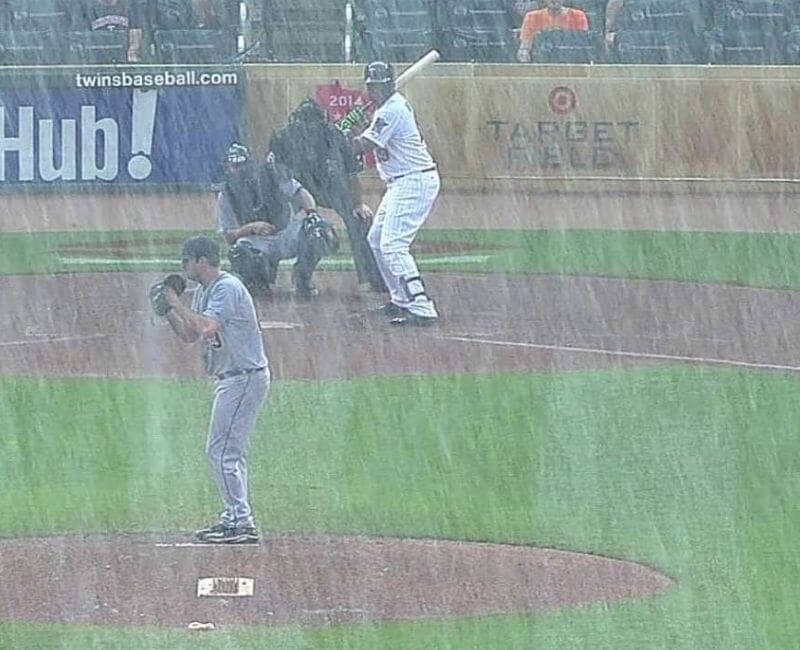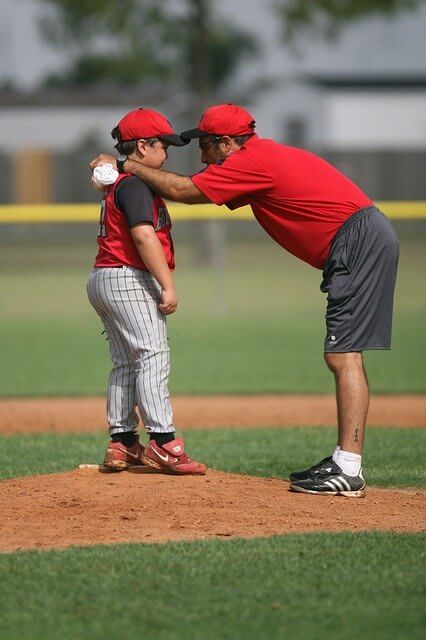Last Updated on September 11, 2023
Is baseball something you enjoy? If so, then you know the excitement of seeing a game go into extra innings or end with a walk-off home run. But have you ever considered the possibility of a tie in baseball? It’s hardly common, but a tie game can occur in baseball.
The subject fascinates and divides followers of baseball, the national game. In this piece, I’ll explain why ties are so unusual in baseball without saying they never happen. I’ll also discuss several notable examples of games that finished in a tie throughout baseball history.
Understanding Ties in Baseball
Some spectators may not understand the reasoning for a tie in a sporting event. After all, we’re used to watching the scoreboard to see who triumphed and who fell short. However, ties are an integral part of many sports, including baseball, and they do occur.
In many sports, when the score is tied after the allotted amount of time has elapsed, the game is considered a tie. Since neither team has scored more goals (for example, in soccer), the game is at a standstill.
But baseball is not a game where you should depend on time.
In baseball, particularly, ties are extremely uncommon. One side will win if they score more runs than the other team does by the end of nine innings (or extra innings, if required). Nonetheless, there are situations where scores are tied.
One possible outcome is that the play is called off because of bad weather. If it starts pouring rain or lightning strikes, the game may be called off before it’s over to ensure everyone’s safety. A tie is reported when neither side can be determined to have been the winner.
Games that are suspended due to things like power outages or unplayable field conditions might also finish in a tie. Until a winner is declared, these games often continue at a later date from where they left off.
When every victory counts in the playoffs, and elimination is a real possibility, ties must be broken. When a playoff game goes into extra innings and is tied, the winner is determined by who scores more runs in those extra innings.
Modern scheduling practices emphasize finishing games rather than ending them without decisive outcomes. So, while ties do occur occasionally in MLB history books dating back over 100 years since records began being kept meticulously, they remain extremely rare today.
So yes! It is conceivable for a baseball game to end in a tie, which may seem improbable considering the unambiguous winners and losers most of the time you see on TV screens announcing who won each day’s matchup.
General Rule in Baseball

The regulations of baseball, also known as “America’s favorite pastime,” are unique. Ties and their absence are subject to one such regulation. In baseball, a tie is extremely rare, in contrast to other sports where a draw is considered a valid result.
As a general rule, baseball games continue until a victory is declared. To clarify, if the score is tied after nine innings, the game will go into extra innings until a winner is determined.
Ties during the regular season are possible owing to factors such as weather and time constraints, but they are uncommon. Because of the essence of baseball, both teams play aggressively and are motivated to win.
Baseball, which places a premium on finding a clear winner through extra innings if required, occasionally has tied games. When you see America’s pastime next on the field, keep in mind that ties are not a common occurrence.
The Rules of a Tie in Baseball
The procedures for breaking a tie in baseball can change from league to league and from level of play to level of play. Ties are extremely uncommon in MLB because of how the game is set up. However, they are not unheard of and do occur.
If a game in the Major League Baseball regular season is tied after nine innings, it will go into extra innings until a winner is decided. Every half inning, both teams have two at-bats to try and score a few runs. This continues until one team finishes an inning with a lead in runs over the other.
There is one circumstance, though, in which a tie can occur in Major League Baseball: inclement weather. There will be no make-up dates for games that are called due to bad weather before they reach normal length (five or six innings).
When trying to break a tie in baseball, suspended games are also taken into account. A game is considered paused and will be picked up from where it left off at a later date if it has reached regulation length or more but cannot be completed for any reason (such as darkness or unsuitable field conditions).
Games in the postseason are subject to different tiebreaker rules than regular season games. There must be a way to break a tie in the playoffs so that one club may move on. It might take the form of sudden-death home run derbies or even more extra innings.
Extra Innings – The Tie Breaker
Each team bats and fields for nine innings in a baseball game. When the score is tied after nine innings, what happens? Extra innings help.
Tied games are played to extra innings. They add excitement to the game until one team takes the lead.
How Do Extra Innings Work?
Inning 10 and Beyond: Both teams play after a tied tenth inning. Like the usual nine innings, each team bats and fields in the top and bottom of each inning.
In contrast to the conventional nine innings, there is no limit on the number of extra innings played. The game continues until one team scores more runs in an extra inning.
Tense Overtime: Extra innings are generally full of excitement and anxiety. Every pitch or hit can impact the game, so pitchers and batters must stay sharp.
In recent years, some leagues have implemented a regulation where a runner starts on second base at the start of each half-inning to speed up extra innings and reduce player fatigue. This rule boosts run scoring and shortens games.
The Role of Weather in a Tie Baseball Game

Weather can decide a baseball tie. Explore how the weather may tie games in this sport:
1. Rain and Game Suspensions
Baseball games can be delayed due to severe weather or storms interrupting play. If the weather doesn’t improve, the game may be canceled. There is a rain delay rule in place for MLB.
- A game is suspended if it cannot be completed on the planned day due to weather or other unforeseen circumstances.
- If the game is tied when suspended, the record may tie.
2. Darkness and Visibility
- Late afternoon or nighttime games may be limited by natural light. If the field becomes too dark for safe play, the umpires may suspend the game.
- Fielders and batters may struggle to track the ball and see pitches in the dark.
- If the game is tied at the time of suspension and cannot be resumed on the same day, it will end as a tie.
3. Unplayable Fields
- Heavy rain might cause waterlogging, rendering the baseball field unplayable. Thus, the game may be called off.
- Field circumstances can cause a tie if the game cannot continue and it is tied.
4. Lightning and Safety
- Lightning is a significant safety risk for players, umpires, and spectators. Lightning near the ballpark may halt or postpone the game.
- A game that is tied and postponed due to lightning or severe weather may result in a tie if it cannot be restarted.
5. Extreme Weather
In rare circumstances, catastrophic weather phenomena such as tornadoes, hailstorms, and hurricanes can cause baseball game suspensions or cancellations. Due to special circumstances, a tied game may be declared a tie.
Suspended Games
In baseball, a game is considered suspended if play has begun but will be interrupted for some reason and must be resumed at a later date. Environment, field conditions, and chance all play a role here.
When Are Games Suspended?
Games are usually postponed due to bad weather conditions, including rain, lightning, or fog. Extreme heat or cold can render a field unusable, while lightning and thunder can endanger both players and spectators. Apart from events happening on the baseball field, such as demonstrations or unruly fans, power failures, stadium problems, and other issues can also cause games to be postponed.
How Is a Game Suspended?
Umpires take into account variables, including player safety and the integrity of the game, while deciding whether or not to suspend play. At any time, including in the middle of an inning, the umpires have the option to call a suspension of play.
Data such as the score, number of innings, and number of pitches thrown are recorded when a game is put on hold. For the time being, it has been put on hold until it can be resumed.
Resuming a Suspended Game
A game that has been suspended will normally be picked up from the point at which it was paused, with the same score, inning, and base runners as when the game was suspended. In the vast majority of instances, the game is postponed and played on a different day or as part of a doubleheader. This enables both teams to prepare for the game and continue playing under equitable conditions.
Ties and Suspended Games
If the teams are tied when play is interrupted, and the game is not restarted or the league regulations forbid it to be continued, then the score will be recorded as a tie. Unless a game is called because of bad weather or some unforeseen circumstance, a tie is extremely unusual in baseball.
Notable Suspended Games
The 2008 MLB All-Star Game ended in a tie because there weren’t enough pitchers to go around, and Game 5 of the 2008 World Series was stopped due to rain and finished two days later.
Playoff Tiebreakers
The winner is determined according to MLB’s established rules when a postseason game ends in a tie. Extra innings are used most often to break a tie, with play continuing until one team wins. The game’s level of tension and excitement may increase as a result.
However, MLB has backup procedures in place in case weather or other unforeseen circumstances prohibit the completion of a playoff game. Games that are interrupted for any reason can sometimes be picked back up at a later time. This guarantees equality and offers both sides a fair shot at victory.
MLB has a number of rules in place for breaking ties at the end of the regular season, including extra innings, postponed games, and the allocation of wild card positions. Head-to-head records, as well as the playing of extra games, are frequently used as one of these tiebreakers.
When this doesn’t work, looking at the teams’ records inside the division or against common opponents is frequently the next step. A single game called a tiebreaker game, may be played to choose a victor in the event of a tie. One pitch or swing of the bat can decide a team’s fate in the postseason, making these games tense and exciting.
Due to the nature of baseball’s competition and the league’s need for unambiguous winners and losers, extra innings and other tiebreaking processes have been implemented to ensure that each playoff series ends with a clear victory.
Why are Tie Games Rare in MLB?
MLB tie games are rare for numerous reasons. Baseball rules are a major reason tie games are rare.
Baseball allows teams to score runs over numerous innings, unlike soccer and hockey, which can tie. Extended play improves the chance of one team outscoring the other.
In each inning, both teams have an equal chance to win. This feature of baseball allows extra innings to resolve a tie after nine innings.
MLB uses several tiebreaker rules to prevent ties wherever possible. These tiebreakers involve extra innings and sudden-death situations until a winner is determined.
Weather is another reason MLB tie games are rare. Weather delays or cancellations can lead to rescheduled games rather than a tie.
Professional baseball’s unique structure and rule arrangement make ties unlikely, even in exceptional cases like halted games.
Examples of Games that Ended in a Tie in MLB
Extremely few games have ended in a tie in MLB’s lengthy and storied history. Nonetheless, there have been a few significant cases where games finished with no clear victory.
The Cincinnati Reds and the Washington Nationals played a game like this on July 18, 2015. The game ended with a 2-2 tie after nine innings. Both teams had opportunities in extra innings but were unable to score, and the game was eventually called because of rain.
The Pittsburgh Pirates and the Houston Astros played a classic game that went the full twelve innings on May 26, 1997, but neither club came out on top. The game was tied 3-3 when nightfall put an end to the action.
On June 30, 2005, the Chicago Cubs and the Milwaukee Brewers played to a thrilling draw. Milwaukee staged a remarkable comeback to tie the game at six runs apiece by the end of regulation after trailing by as much as six runs in the eighth inning.
Tie in College Baseball
Unlike in the major leagues, college baseball games rarely end in a tie. However, there have been times when games had to be stopped before a victor could be declared owing to bad weather or darkness. A tie is usually called in these situations.
In collegiate baseball, the tying rules are determined by the league or organization. Some leagues may have rules regarding ties in games, while others may follow the NCAA’s norms.
If the score remains tied after a specified number of innings and the game cannot be played to a conclusion for whatever reason, the game may be declared a tie. This prevents teams from playing games that go on for too long, which could affect their performance in subsequent matches.
Ties in collegiate baseball are extremely unusual compared to other sports, such as soccer and hockey, but they do happen on occasion.
Tie in High School Baseball
There are limited playing fields at many high schools. Thus, games must stop by a certain time. The game may end in a tie if the allotted time has expired and all innings have been played.
Inclement weather is another potential tiebreaker. Games are not uncommon to be cut short because of weather conditions, such as rain or lightning. This results in a tie if the game is called before it becomes official (usually after five complete innings) due to weather.
Tie in Youth Baseball
Youth baseball games can tie. Sometimes, ties are more widespread at this level for various reasons.
One cause is child baseball game time constraints. These time constraints prevent games from running endlessly and allow for numerous games each day. A game may tie if it reaches the time limit without a winner.
Another aspect is player skill and experience. Professional baseball teams have more pitching depth and offensive power than youth teams. This can result in low-scoring games where neither team scores enough runs to win.
Youth baseball games can also be affected by weather. If a game is called off due to rain or other adverse weather, it will tie if enough innings are played.
Is it Possible for Both Teams to Win a Game?
The idea of victors and vanquished is central to baseball, a sport built on the concept of competition. On extremely rare occasions, though, it is possible for both teams to emerge victors. Why is this even possible? It’s time to explore the outcomes that could benefit both sides.
If the game is an exhibition or a charity event, both teams have a chance to win. Regular season and postseason games are played under separate guidelines and with different goals. When competing for a good cause, organizers may decide that everyone comes out on top, no matter the result.
There are tournament formats, like round robin and double elimination, where both teams can win. Instead of depending purely on wins and losses, each team in these formats earns points based on their overall performance in the event.
If that happens, it is possible to have a tie for first place in the regular season and crown two champions.
If neither team can break the tie after a certain amount of time has elapsed (as is the case in most tiebreakers or sudden-death circumstances), then both teams may be declared winners. It’s common practice to call it a day when the weather or the waning light makes play unsafe.
How Do Teams React When the Game Ends in a Tie?
When a baseball game concludes in a tie, the players on both teams typically react in different ways. Some players might be upset by this, while others might view it as a lost chance. How the team responds to a draw will depend on the specifics of the situation and the objectives they set for themselves going into the game.
A tie is a disappointing result for clubs playing in regular season games. They’ve played through nine or more innings of intense baseball, yet there still isn’t a winner. It’s possible that in such cases, players will feel that they didn’t truly win the game.
In contrast, it is not uncommon for games to end in a draw during preseason or exhibition play. In certain situations, when teams are being challenged, a tie may be seen as a satisfactory outcome.
Professional baseball players wear ties regardless of how they personally feel about them. They embrace the fact that not every game has to have a winning squad with dignity and professionalism.
The coaches heavily influence how a team responds in a tie game. Instead of focusing exclusively on whether a game concluded in a win or a loss, they emphasize both the positives and the opportunities for improvement.
Wrapping Up
While ties may exist as an uncommon occurrence within professional baseball leagues like MLB today due largely thanks to efforts aimed at avoiding this particular outcome wherever feasible via extensions known commonly called “extra innings.” But you can not take control over some things.
Therefore, we see a tie in a baseball. But that tie is not like what we see in sports like soccer or cricket. In, Baseball tie simply means the authority could not finish the game due to some unavoidable reasons. A tie is not an option like many other games that we see.
More Resources
What Is A Perfect Game In Baseball
What Is Chin Music In Baseball?
Average Baseball Pitch Speed By Age And Type
What Is A No Hitter In Baseball?

Hello everyone. My name is Jason Butler, and I live in California, America. I was a professional AAA Minor League Baseball player. I lost my chance of playing MLB for injury issues, but I did not lose my love for baseball. I attended the coaching training program and am now working as a coach in a small school in San Diego.
I always love to share my experience and knowledge if that can help you. Play baseball, and stay fit.
